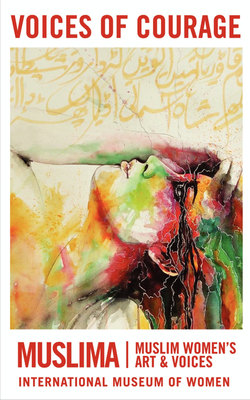Читать книгу Voices of Courage - International Museum of Women - Страница 3
На сайте Литреса книга снята с продажи.
Introduction
ОглавлениеAs Curator for the Muslima: Muslim Women’s Art & Voices global exhibition, I’ve found myself repeatedly asking people the same question: “What is the first image that comes to mind when you think of a Muslim woman?”
Inevitably, whether I’m speaking to a group of graduate students at a prestigious university, to journalists from around the world, or to a general audience, the answers I get are strikingly similar: Veiled. Arabic. Submissive. Victim.
I’ve been part of the national and international dialogue on Muslim issues for a decade now, and unfortunately the image of the Muslim woman hasn’t changed. The answers I get today to my question are the same ones I got soon after 9/11. Worse, the stereotypes that were emerging a decade ago seem to have only been cemented in people’s minds as time has passed. The “helpless Muslim woman” seems to no longer be just a stereotype; now, “Muslim woman” has become synonymous with a helpless victim.
That global context is one of the many reasons why the Muslima: Muslim Women’s Art & Voices exhibition is so timely, and so necessary. Courageously confronting the stereotypes head on, this exhibition magnifies the power, creativity, and visibility of the many brave Muslim women around the world. Despite belittling stereotypes, Muslim women globally are making great contributions to the community, whether through art, activism, or writing.
In this book, we’ve included inspiring stories and powerful artwork from Muslim women around the world. These are all brave women who have undertaken heroic acts.
Dr. Shirin Ebadi is the first Muslim woman to receive the Nobel Peace Prize. Trained as a lawyer, Dr. Ebadi has worked for more than 40 years to improve the lives of women and girls in Iran. Her life’s work to bring justice to victims has led to Dr. Ebadi being jailed, to having her life threatened countless times, and to the confiscation of her Nobel Prize medal by Tehran’s Revolutionary Court.
Undeterred, in 2006, Dr. Ebadi helped forge the Nobel Women’s Initiative to magnify the power and visibility of women working for peace.
Fahima Hashim is a member of the Nobel Women’s Initiative. Hashim is the director of Salamah Women’s Resource Center in Sudan, whose most successful campaign has been to reform laws on rape that, in their current form, prevent the survivors of sexual violence from accessing justice. Sudanese laws currently grant conditional immunity to officials, especially police and security forces, who use rape as a weapon of war in Darfur.
Maria Bashir, the only female Prosecutor General in Afghanistan, has taken on the mission of educating and empowering the women in her community of Herat. Knowledge about their rights gives women courage, Bashir believes. The knowledge Bashir is imparting is empowering women to file police reports and claim their right to safety and equal treatment. The sad irony is that while Maria Bashir protects women and children, her own life is under threat from both the local government and the Taliban. Bashir has sent her children out of the country to keep them safe while she moves from safe house to safe house, never stopping her work to advance women’s rights.
These are a few highlights of the many inspiring women you’ll meet in this collection. My hope is that this book (along with the exhibition) will begin a new discussion about the realities of what it means to be a Muslim woman today.
Bravery. Tenacity. Strength. That’s what I think of when I think of Muslim women.
Samina Ali Muslima Curator July 2013
